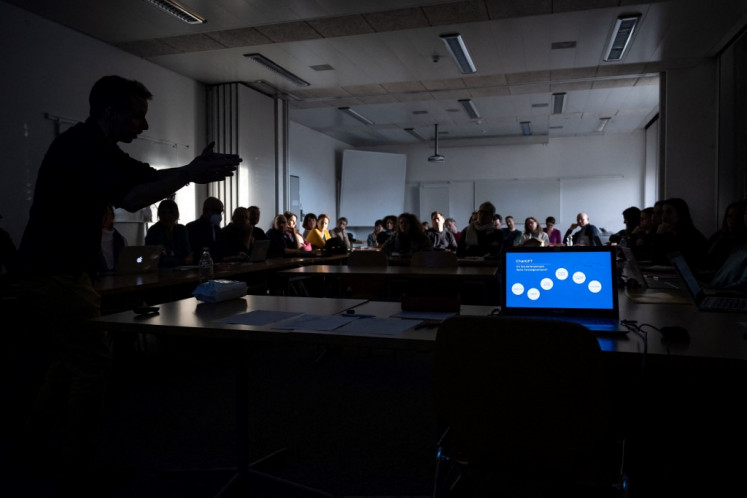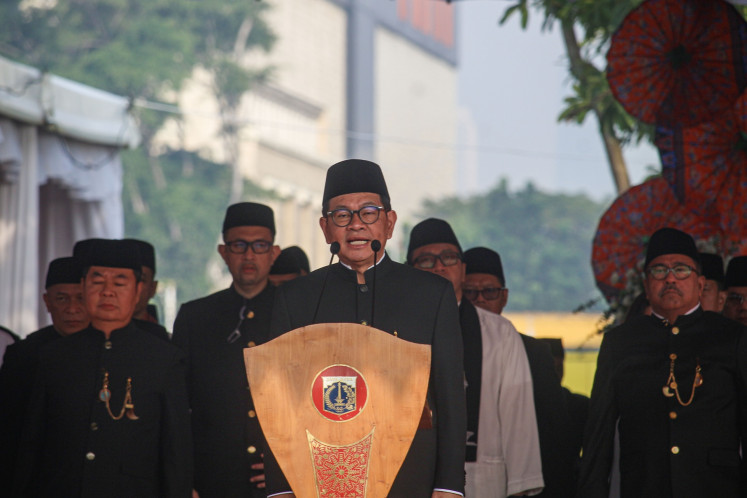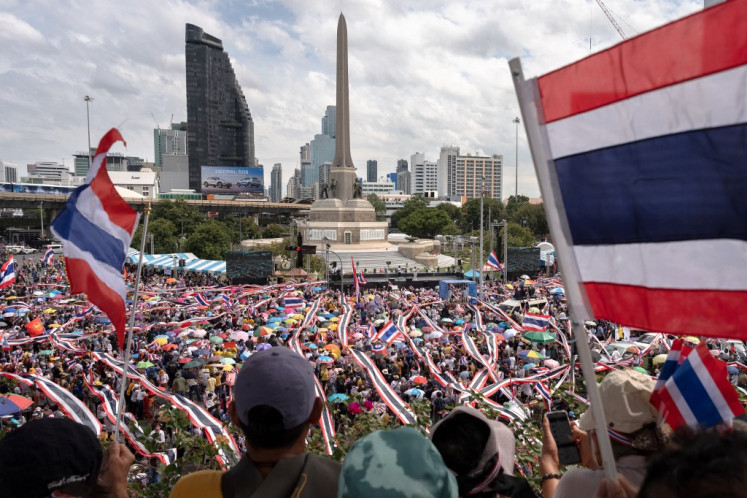Popular Reads
Top Results
Can't find what you're looking for?
View all search resultsPopular Reads
Top Results
Can't find what you're looking for?
View all search resultsWhere are the literary agents? Missing link in Indonesian publishing industry
The literary agent is the missing link in the Indonesian publishing industry, where writers deal directly with publishers instead of having someone else doing the job for them.
Change text size
Gift Premium Articles
to Anyone
 The International Rights Center at the 2019 London Book Fair, held from March 12 to 14 at Olympia Hall in London. (JP/Devina Heriyanto)
The International Rights Center at the 2019 London Book Fair, held from March 12 to 14 at Olympia Hall in London. (JP/Devina Heriyanto)
R
ows and rows of tables fit neatly into the International Rights Center located on third floor of Olympia Hall, where the 2019 London Book Fair took place from March 12 to 14. Since most visitors roamed around the exhibits on the first and second floors, the third floor was rather secluded and exclusive to the literary agents who had booked tables there to meet people with appointments.
With more than 600 tables, the so-called Trading Floor for Content is what makes the London Book Fair the biggest business-to-business literary event in the world.
“This is where business actually happens,” said Hetih Rusli, lead editor of the fiction department at PT Gramedia Pustaka Utama (GPU), one of the largest publishers in Indonesia. She was showing the room to journalists from The Jakarta Post and Kompas, while waiting for an agent with whom she had a meeting.
It was the third and last day of the fair and she had an appointment at 10 a.m. Each appointment only lasted for 30 minutes and had been in the making for months before the actual meeting.
At the book fair, Hetih was on the hunt for new titles to acquire for GPU. From the first day, her days consisted of meeting upon meeting with various literary agents. As part of the Indonesian delegation to the book fair, Hetih only spoke at a panel once. The rest of her time was dedicated to buying rights from literary agents.
The literary agent is the missing link in the Indonesian publishing industry, where writers deal directly with publishers instead of having someone else doing the job for them.
“We don’t have agents, so I was not familiar with the concept of a literary agent because I deal directly with the publisher,” said singer-cum-writer Dewi “Dee” Lestari. “I’ve been known as a very aggressive marketer. I sit down with the publisher to talk about how to market my book.”
Her first encounter with the concept of a literary agent was at the 2014 Frankfurt Book Fair, during which Indonesia prepared for attending the 2015 Frankfurt fair as a guest of honor.
“I came with this naive mindset that I should do the same to market my books,” said Dee. “When I came, people asked me: ‘Do you have an agent?’ When I said no, they just left.”
Dee was appalled. Only then did she realize how differently the publishing industry worked outside of Indonesia.
Read also: Laksmi Pamuntjak’s first English novel ‘Srikandi’ acquired by Penguin Random House
“When I came in 2015, I knew that I should not worry about marketing myself or my books, someone else should do it for me. That was a great lesson,” said Dee. Her book Perahu Kertas had since been translated by Tiffany Tsao into English as Paper Boats and published by Amazon Crossing.
In the International Rights Center, there is only one table belonging to Indonesia, booked by the Borobudur Agency. The agency was established by the Indonesian Publishers Association (IKAPI) to promote and license Indonesian content abroad.
According to Thomas Nung Atasana, the director of the Borobudur Agency, there are only three other literary agents in Indonesia: Yani Kurniawan of the Tuttle-Mori Agency, Santo Manurung of the Maxima Agency and Alda Trisda of the Trisda Literary Foundation.
“It’s easier when a literary agent comes into the picture. Writers do not have to care about the technicalities of publishing their work as long as their writing is done,” said Thomas, “It’s the literary agent who has to think and choose the suitable publisher for the book and make a deal with the publisher.”
To tread between the two different systems in Indonesia and abroad, Thomas mentioned three common scenarios in which he worked. The first is to help Indonesian publishers sell their rights to foreign publishers. In his view, publishers are buyers and not sellers. To increase the sales of translation rights abroad, literary agents are needed.
The second scenario is to help Indonesian writers whose books are published in the Indonesian language by Indonesian publishers and are who looking for a foreign publisher that will buy the translation rights. Among the writers Thomas represents is Reda Gaudiamo, whose coming-of-age book Na Willa has been translated into English and published in the United Kingdom by the Emma Press.
The third is to receive unpublished manuscripts from writers and help them find publishers.
“The last one is how a literary agent is supposed to work,” said Thomas. “Writers should look for agents, not publishers.” (kes)









